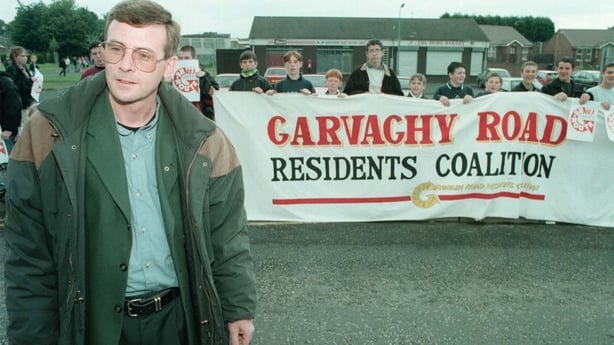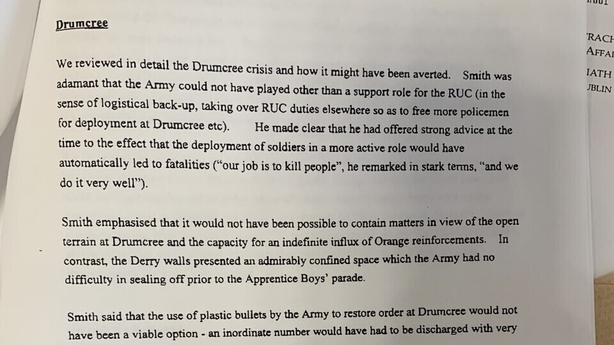By David McCullagh, Conor McMorrow and Justin McCarthy
Hugh Annesley was worried. Speaking to an Irish diplomat in March 1996, the RUC chief constable predicted that the forthcoming marching season would be difficult, with no signs of compromise between the Orange Order and residents' groups, particularly in Drumcree.
The previous year, the RUC had attempted to prevent an Orange Order march down the mainly nationalist Garvaghy Road.
After a two-day standoff, agreement was reached that a march could go ahead, without bands. But the compromise was soured for residents by the response of DUP leader Ian Paisley and Ulster Unionist MP David Trimble, who held their arms in the air in apparent triumph as they led the march into Portadown.
Trimble was subsequently elected leader of the Ulster Unionist Party – according to many observers, largely because of his performance at Drumcree.
Now Annesley was uneasily looking ahead to July, conscious that Trimble would be under pressure from Orange hardliners who "will remind him of how he was elected leader and demand a repeat performance…".
On 6 July, 1996, Annesley banned the march down the Garvaghy Road; within hours, 10,000 angry protesters swelled the Drumcree crowd, while Loyalist riots broke out in different parts of Northern Ireland.
The taoiseach was furious that negotiations involving clergymen had been 'swept aside' by the RUC U-turn.
Five days later, as 50,000 people were expected to show up and attempt to force their way down the road, Annesley reversed course, and allowed the march to go ahead.
That night, John Bruton and John Major had a flaming row over the telephone.
The taoiseach was furious that negotiations involving clergymen had been "swept aside" by the RUC U-turn.
But Major hit back, claiming that one of the problems was "that the churchmen and others have been trying to get the Garvaghy Road residents to put up someone to negotiate other than a convicted terrorist...".

Major was referring to the Garvaghy Road Residents' Coalition spokesman, Brendan McKenna, who had been convicted and jailed in the early 1980s for his role in an IRA bombing in Portadown. As a result, Orangemen refused to talk to him.
Bruton replied: "He served his sentence". After the prime minister said that nobody would talk to him, the taoiseach said: "David Ervine [the leader of the Progressive Unionist Party, and a key player in all-party talks] was a terrorist too."
Bruton continued: "I don’t think it is reasonable to use the excuse that this man was convicted. If he was convicted, he served his sentence and he has been released. A number of people in politics in this country on both sides of the border and on both sides of the political divide were in jail at some time or other.
"I’m in Government with a man who was in jail. The Minister for Social Welfare was interned for a lengthy period."
Bruton was referring to Democratic Left leader Proinsias De Rossa, who had been interned as an IRA member during the Border Campaign in the late 1950s.
Major threatened to hang up
The prime minister said that Annesley had taken his decision on operational grounds – security forces expected 50,000 protesters in Drumcree on 12 July, enough to overwhelm the RUC and the army, and putting the Garvaghy Road residents at risk.
Bruton argued that "this brings back the same type of argument that was used to capitulate to the Ulster Workers strike in 1974", adding that the RUC had given in to the force of numbers on one side. "Backing off does not convey a sense of resolution or a sense that your Government is in charge."
That was too much for Major, who said: "I resent that John, and if you want to continue the conversation in that fashion you can continue it alone…".
Major was persuaded not to hang up, and the row continued. The prime minister did admit that allowing the Orangemen march down the Garvaghy Road would have wider ramifications: "I have no doubt that Sinn Féin and the IRA are rubbing their hands in glee at the outcome."

The whole affair was a disaster for both governments, and for the peace process. But it could have been a lot worse, according to the British Army commander in Northern Ireland, Lieutenant General Sir Rupert Smith.
In September 1996, Irish officials challenged him on why the Army didn’t do more to support the RUC at Drumcree. General Smith insisted there was nothing more the Army could have done.
Smith explained that "he had offered strong advice… that the deployment of soldiers in a more active role would have automatically led to fatalities". Smith added, "in stark terms": "Our job is to kill people. And we do it very well."
Perhaps it was just as well the British Army took a back seat at Drumcree in 1996.
Based on documents now available to view in the National Archives of Ireland.

